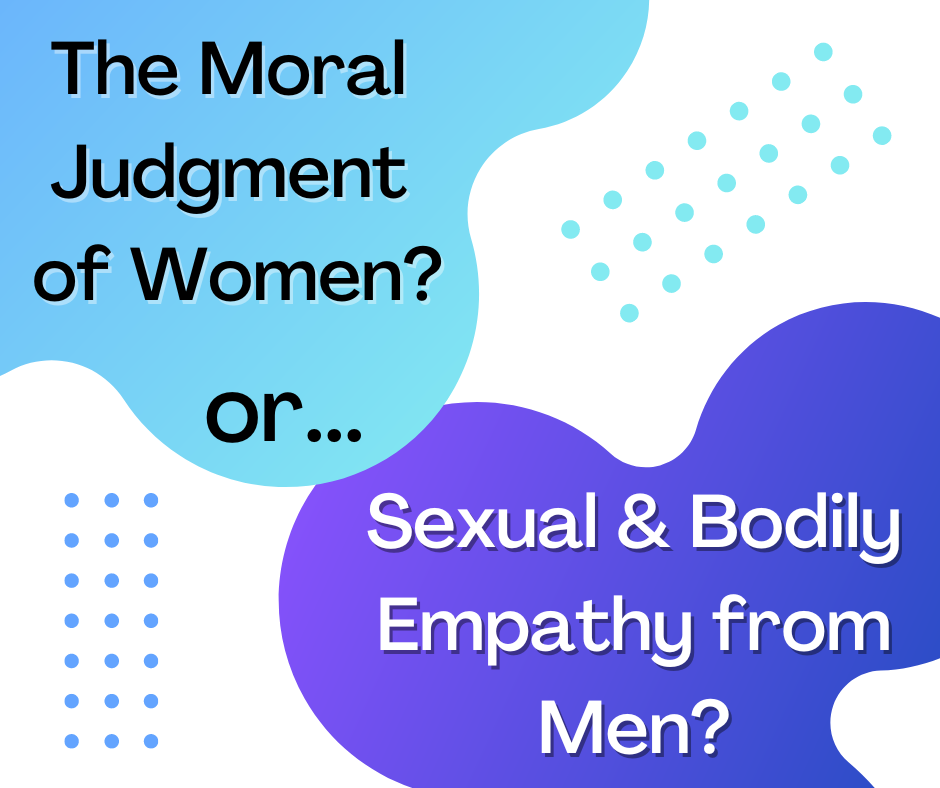
I was recently listening to one of my favorite podcasts — This American Life — where they interviewed the original researcher who studied the incidence of sexual aggression on college campuses in the 1970s and 1980s. Mary Koss, PhD, was the first to study this topic through the lens of detailed behavioral questions. For example, when asking, “Have you been raped?”, a tiny percent of women responded yes, while more nuanced questions such as, “Have you ever had someone use force or threaten to harm you to have sexual intercourse when you didn’t want to?”, resulted in a much higher percentage of affirmative responses. Her detailed questions all matched the legal definition of rape, although at the time, the general understanding was that rape only included a sexual attack from a stranger.
This research is where the now ubiquitous “one in four” statistic about the rate of rape or attempted rate for women on college campuses first came from (and which was later replicated in other research studies). Dr. Koss introduced the concepts of “acquaintance rape” and “date rape” as the most common forms of rape, and that although rape, coercion, and aggressive behaviors were not uncommon in sexual encounters, there were not necessarily identified as such.
Now almost 50 years later, when Dr. Koss reviewed the current statistics, she was surprised and disappointed. While our societal understanding of what constitutes rape has shifted, the rate of sexual abuse continues to be high and the rate of reports to police continues to be low. It has not changed since the 1980s, indicating that this shift in understanding has not occurred at the individual and interpersonal level.
The absence of change is not a surprise to me. In 2016, I spoke at a storytelling event, sharing a personal story about a consent violation I experienced and how I handled it. I dove into the “gray areas” of sexual coercion — physical, mental, and emotional — that are so common in sexual interactions (e.g., repeatedly trying to get a partner to do a specific act, even after they’ve stopped you; using guilt; or assuming and moving forward, despite a previous conversation to the contrary). Between the live audience and online feedback after the video of the story was posted, I heard from hundreds of women that this had happened to them. And that they blamed themselves afterward. They had internalized our underlying societal belief that women are the cause of most rape or sexually coercive situations.
Plus, most perpetrators don’t see what they did as illegal, immoral, or even harmful. My video story is used each semester as an educational tool for groups of fraternity men in San Diego. After the first time the video was shown, the facilitator reported back to me that the room was silent. She asked them to raise their hands if they saw any of their past behavior or that of their friends, reflected in the video. All hands went up, and one guy bravely admitted, “We didn’t know THIS is what you’ve been talking about. We knew we weren’t rapists, but we didn’t know all of these situations were included or were a problem.”
This lack of awareness, empathy, and responsibility connects sexual coercion and sexual pregnancy as they play out in our country, as we are currently experiencing reversal of the Roe v Wade Supreme Court decision from 50 years ago. Over the years, bit by bit, a woman’s right to access an abortion — something that is treated as part of women’s healthcare in other wealthy nations — has been dismantled in a number of states. And now that the Supreme Court has indeed overturned Roe, we are seeing or will see strict abortion restrictions or bans in at least half of our states.
In light of this recent happening, a friend on Facebook reposted this gem:
“A woman can be the sluttiest slut in the entire world who loves having orgasms all day long and all night long, but she will never find herself with an unwanted pregnancy unless a man shows up and ejaculates irresponsibly. Women enjoying sex does not equal unwanted pregnancy and abortion. Men enjoying sex and having irresponsible ejaculations is what causes unwanted pregnancies and abortion.”
This was originally part of a Twitter thread by Gabrielle Blair that went viral. Gabrielle describes herself as a “Mormon mother of six.”
To clarify, pregnancies can and do happen occasionally despite using the pill or other contraception like condoms. And clearly, Gabrielle is specifically referencing men who sleep with women. But over-generalizations aside, this post exemplifies our cultural assumptions that men can and should have more sexual freedom than women, without judgment and without consideration of the impact on the woman.
Like Amanda Gorman, National Youth Poet Laureate stated, “When the penalty for rape is less than the penalty for abortion after the rape, you know it isn’t about caring for women and girls, it’s about controlling them.” There is a heavy moral component to the perception of who is “worthy” of compassion and caring. Fetuses who haven’t interacted in the real world are considered innocent and therefore worthy of respect and compassion. Women who are sexual in ways that are deemed “morally” inappropriate (which is pretty much all sex), and have therefore “sinned” in this world, are deemed not deserving of respect and compassion…in rape or abortion.
While we have made much progress in gender and sexual equality in the US, when looking at these two current social topics, it’s clear that the following presumptions about sexual responsibility and moral judgment continue to interfere with equality:
-
It’s common to solely blame women (and for women to blame themselves) for negative sexual experiences and consequences.
-
There is still moral judgment attached to women pursuing sexual pleasure or physical connection.
-
We fail to adequately educate boys and men to understand and prevent sexual coercion and unwanted pregnancies.
This needs to change for the physical, mental, emotional, relational, financial, and social health of women. So, what if sex and relationship education for boys (and men!) was shifted (both in schools and at home), and focused a bit less on the nuts and balls… er bolts, and more on sexual behaviors, motivations, and socioemotional training? How might facilitating conversations around the following concepts affect the rates of unwanted sexual interactions and unwanted pregnancies?
-
Every time you ejaculate, you are responsible for what your sperm and semen do after the sexual encounter (and they can live for days inside a woman).
-
What you want sexually may not be what someone else wants, even if they seem as turned on as you. You cannot read someone else’s mind.
-
The body in front of you is a fellow human being worthy of respect, dignity, and compassion.
-
If you wake up after a sexual encounter and aren’t 100% sure that the person you were with wanted to do everything you did sexually, then it’s time to reassess your choices, amount of alcohol consumption, communication skills, etc.
-
Everyone in a sexual encounter has a right to safety and pleasure and what that looks like for each person can be very different.
-
Girls and boys are taught to behave differently in dating and sexual encounters and that means that you may be pushing someone to do something they don’t want to.
I also think our sexual education discussions need to provide behavioral, emotional, and physical details for everyone, like:
-
What is it like for a female body to grow a fetus inside of her for almost 10 months?
-
How does this and birth change a body and can boys and men and girls and women visualize this for themselves?
-
What do blue balls feel like? What does having an uncontrolled erection feel like? How can you take care of your well-being and not impose your needs on another?
-
What does rejection feel like? How does the fear of rejection impact your choices?
-
What is sexual coercion? How are guilt, repeatedly trying, social threats to someone’s reputation, the silent treatment, sulking, begging, or “jokingly” stopping someone from leaving the room all aspects of coercion?
-
Many people use alcohol to numb themselves from the uncomfortable feelings of social anxiety around sex — what are those feelings and how could you make healthier choices with them?
I’m not suggesting we use scare tactics to make boys and young men afraid of their desire, sexual pleasure, or physical connection. And I’m not saying that women don’t have any responsibility. Of course, they do. I’m also not saying that only men commit rape or sexual coercion, but I am statistically focusing on the largest demographic group by far that commits both the act of rape and impregnation.
I am advocating for compassion tactics. I want to see a greater balance in responsibility, the right to bodily pleasure, and empathy. Everyone in a sexual encounter has responsibility for the potential outcomes. Everyone in a sexual encounter has a right to their desires and boundaries. And everyone in a sexual encounter has a right to enjoy the experience.
Instead, the responsibility is routinely leveled on women’s shoulders because we judge and blame women for being immoral and therefore deserving of negative consequences.
How can we work to shift the societal narrative to caring about the impact of sexual encounters on women’s bodies and emotional well-being, instead of only blaming them for the sexual encounter and holding the other party innocent?
~Dr. Jenn Gunsaullus — Sociologist, Intimacy Speaker, & Relationship Coach

